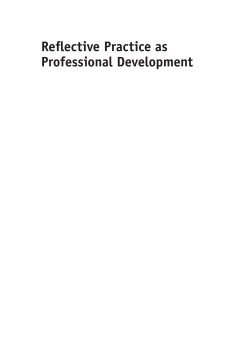
Additional Information
Book Details
Abstract
This book presents a researcher’s work on reflective practice with a group of high school teachers of English in Japan. Beginning with a series of uncomfortable teacher training sessions delivered to unwilling participants, the book charts the author’s development of new methods of engaging her participants and making use of their own experiences and knowledge. Both an in-depth examination of reflective practice in the context of Japanese cultural conventions and a narrative account of the researcher’s reflexivity in her engagement with the study, the book introduces the concept of ‘the reflective continuum’ – a non-linear journey that mirrors the way reflection develops in unpredictable and individual ways.
Reflective Practice as Professional Development, an accessible and well-written study, will resonate with educators interested in reflective practice, professional development, teacher identity, and the Japanese educational context. Drawing upon the work of Schön, while taking into account “the pervasive and inescapable conventions” of Japanese society (tatemae/honne), Watanabe shows how the transformative power of reflection helped her participants negotiate and develop their professional identities, as they made sense of their practice.
Reflective practice is highly context specific and different contexts will demand different approaches to reflection. Atsuko Watanabe has produced a superb study of the reflective practices of seven in-service high school English language teachers in the context of Japan. Thus this book is a blue print for others (teachers, academics, administrators, government officials) wishing to implement professional development of language teachers in Japan through the concept of reflective practice.
Atsuko Watanabe is Senior Lecturer of English for Liberal Arts at the International Christian University, Japan. She has over 20 years’ experience as an English teacher. Her research interests include teacher development, teacher cognition, reflective practice and researchers' reflexivity in qualitative research.
Reflective Practice as Professional Development should be recommended to anyone with an interest in RP, especially in carrying out RP as an evidence-based practice. Watanabe’s detailed presentation of her cases and data collection procedures, as well as the rich contextualization of the entire study and focus on open-ended professional development will provide a model for future research in RP...
Bill Snyder, Kanda University of International Studies, Japan
Reflective Practice as Professional Development is a fine example of cross-cultural research that takes the reader on a reflective journey full of fascinating insights into how reflective practice is understood and experienced by a group of teachers in Japan, highlighting both important culturally specific elements and aspects of teacher development common to English Language Teachers all over the world.
Table of Contents
| Section Title | Page | Action | Price |
|---|---|---|---|
| Contents | v | ||
| Acknowledgements | ix | ||
| 1 Introduction and Preface: Embarking on the Journey of Reflective Practice | 1 | ||
| 2 Designing a Better Way to Learn about Teachers and Professional Development | 10 | ||
| 3 Situating My Study: Reflective Practice in the Japanese Context | 23 | ||
| 4 The Reflective Continuum | 45 | ||
| 5 Reflective Practice and the Consolidation of Professional Identity: Cases of the Novice Teachers | 61 | ||
| 6 Reflective Practice and the Consolidation of Professional Identity: Cases of the Experienced Teachers | 83 | ||
| 7 Teachers’ Awareness and Understanding: Exploring Teacher Cognition | 105 | ||
| 8 The Reflective Interventions: Creating a Space for Expression | 138 | ||
| 9 Implications for Professional Development Opportunities for Japanese Teachers | 162 | ||
| References | 175 | ||
| Index | 184 |
